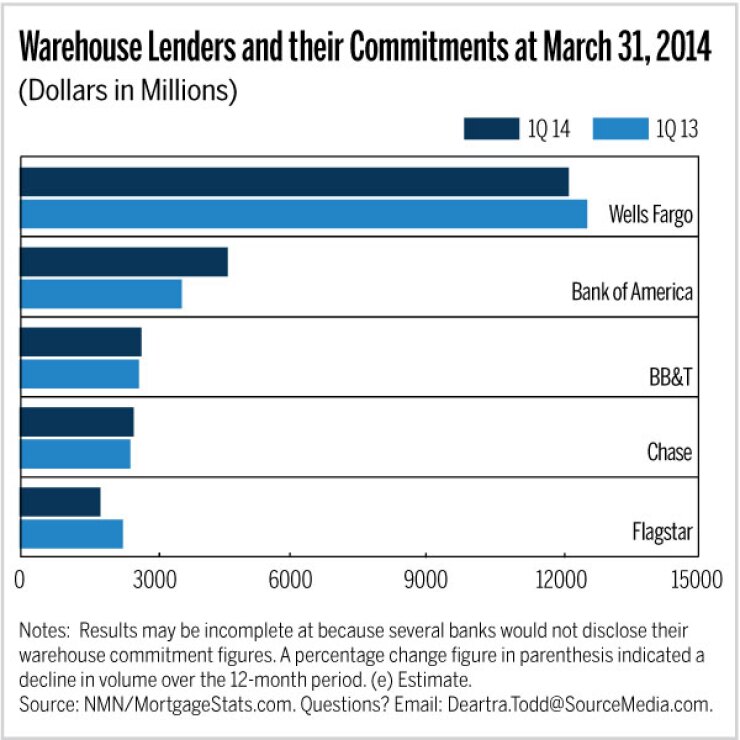

A lot of home lenders' bottom lines have been under pressure recently, and that makes it more tempting for mortgage companies to fraudulently double-pledge loans, potentially increasing warehouse lending risk.
There should be broader awareness today than there was during the last decade of this risk of a lender fraudulently pledging the same loans to different warehouse lenders multiple times. Double-pledging played a notorious role in
The risk has certainly dropped compared to 2009, but it looks likely to have increased compared to about a year or so ago. Since then, profit from loan volume has become harder to come by due to a jump in rates from historic lows, and lender expenses have gone up due to major regulations that took effect early this year.
Instances of the same property being banked at multiple warehouse lenders have decreased compared to the TBW days, but are still commonly detected, said Brian Fitzpatrick, president and chief executive of LoanLogics.
"What I've heard is that the warehouse lenders are probably seeing maybe one [instance of double-pledging] a quarter as of late. So it has significantly dropped off from what we've seen in the past," said Fitzpatrick, whose Trevose, Pa., company helps market participants mitigate risks. "However, we have reached a new low if you will in the industry relative to profits at mortgage lenders."
Mortgage Bankers Association statistics show only 54% of mortgage lenders made a profit in the six months between the fourth quarter of last year and the first quarter of this year.
"We're talking 46% of lenders are just not making money right now and that's the first time we've seen that in a very, very long time," Fitzpatrick said. "Now, when those types of things happen, obviously, you need to be more guarded against desperation or desperate acts."
At the same time, home lenders and the warehouse lenders that provide them interim financing are starting to show a willingness to originate and fund riskier loan products. And some smaller warehouse lenders that have only four to six lines are in the market.
The main protection against double-pledging today is warehouse lenders' use of the MERS System. But these smaller warehouse lenders are probably the only players that might not be using it, said Michele Perrin, an industry consultant who has served as an expert witness in double-pledging cases. She previously worked for a bank warehouse lending unit.
"The warehouse lender can name themselves in MERS, in the MERS chain of title, as interim funder, so once anyone has named themselves as interim funder, that's in MERS. If somebody else tries five minutes later or five days later to name themselves as interim funder on that same loan, it's going to pop up as a duplicate right away to get notified that there's already a party in that position," she said.
When asked if all warehouse lenders are registering as interim funders, Perrin said the mainstream lenders are but she occasionally has to advise smaller ones to use the registration system. The technology is accessible to smaller players so long as they know to use it, she said.
Some warehouse lenders used MERS when double-pledging abuses were rampant. The problem was the use wasn't widespread or frequent enough, said Perrin.
"You need to know where your money is moment by moment. So hopefully people are using it all throughout the day as they're funding loans," she said.
MERS might not provide complete protection against double-pledging if there is a gap between when warehouse lenders fund loans and when they register them on the system, Fitzpatrick said.
"MERS has had its challenges relative to accurately recording information," he said. "It will eventually be accurate and eventually work out, but these particular cases of fraud are perpetrated so quickly." He advises warehouse lenders to be wary of the risk even if they use the system.
Past challenges at MERS related to user delays in registering loans are addressed by tighter MERS policies regarding those members, said Janis Smith, a spokeswoman for MERSCorp Holdings in Reston, Va., which owns and runs the system.
"There are really tighter compliance protocols and reconciliation requirements," she said. "MERS members really are required to adhere to our quality assurance protocols and if they don't they are in violation of MERS rules and could be subject to penalties or even termination" of their participation in the system.
It is unclear how many warehouse lenders might be operating outside of the system, Smith said. "I know that within the system it is a deterrent to double-pledging fraud," she said.
Such fraud may be severely reduced today compared to the TBW era, but without assurance that every property securing a loan is accounted for and can be referenced, it will remain a risk, said Cy Brinn, chief operating officer of
"I think that until there is a universal system that is used to track all real estate loan collateral there is a risk of double-pledging," he said.





